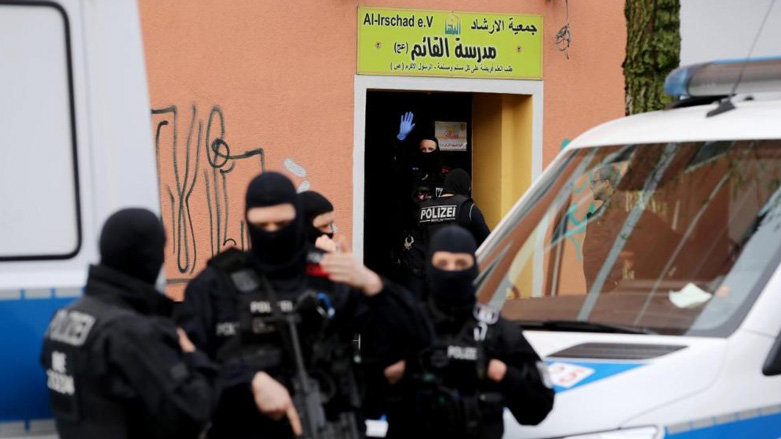US welcomes Germany’s ban on all Hizbollah activities

WASHINGTON DC (Kurdistan 24) - US Secretary of State Mike Pompeo issued a statement on Thursday, welcoming the German government’s decision earlier that day to ban all Hizbollah activities, political, as well as military.
A statement issued by Germany’s Interior Ministry explained that Horst Seehofer, the Interior Minister “today banned all activities by the Shiite terrorist organization, Hizbollah.”
Earlier that morning, German police had raided sites in five cities, the ministry announced. The raids were conducted at four mosques and cultural associations, as well as the private residences of the leaders of those associations, including “their board members, treasurers and tax advisers,” CNN reported.
None of the four institutions that police searched were formally part of Hizbollah, but German authorities, nonetheless, viewed them as linked to the organization.
They included Al-Irschad mosque in Berlin; the Al-Mustafa community center in Bremen, in the north of the country; the Imam Mahdi Center in Münster; and the Association of the Lebanese Immigrant Community, in Dortmund, both in the state of North Rhine-Westphalia, in western Germany.
In addition, searches were conducted in Recklinghausen, also in North Rhine-Westphalia.
German authorities estimate that some 1,100 people in the country have links to Hizbollah.
Previously, Germany had banned Hizbollah’s military wing, as the entire European Union (EU) had done in 2013. But Thursday’s action proscribed political activities on Hizbollah’s behalf as well.
“We commend Germany for banning Hizbollah in its entirety as a terrorist organization and for taking strong action against suspected Hizbollah supporters,” Pompeo said in a statement.
“In addition to killing many of their own compatriots, Iran-sponsored terrorist group Hizbollah has American blood on its hands and continues to plot and carry out attacks around the world,” Pompeo continued.
According to the State Department, Iran provides Hizbollah with $700 million a year, nearly 70% of its annual budget.
Israel also welcomed the ban, its Foreign Minister, Israel Katz, calling it “a valuable and significant step in the global fight against terrorism,” while its ambassador to Germany, Jeremy Issacharoff, stated, “We welcome the timely decision” by Germany “to ban all activities of the Shiite terrorist organization, Hizbollah.”
According to German security officials, Hizbollah uses Germany for fundraising and as a safe area. Most dramatically, as Seehofer told the German newspaper, Bild, Hizbollah uses Germany territory to plan attacks elsewhere.
Col. Norvell DeAtkine (US Army, Retired), former director of Middle East Studies at the US Army’s John F. Kennedy Special Warfare Center and School at Fort Bragg, advised Kurdistan 24 that Hizbollah seemed to have a “very significant” presence in Germany, and it was an “inescapable conclusion” that Hizbollah’s presence was being exploited by Iran, whether to carry out acts of violence or merely for influence operations.
German Foreign Minister, Heiko Maas, in expressing his support for the ban, added another charge against Hizbollah: “one of the supporters of a war criminal, the Syrian ruler [Bashar al] Assad.”
With Thursday’s decision, Germany joined the UK and the Netherlands as European countries proscribing all Hizbollah activities, and Pompeo called on “other EU member states to follow suit and hold Hizbollah accountable.”
The Iran-Iraq War and Origins of Hizbollah
Hizbollah grew out of Israel’s 1982 invasion of Lebanon, as Israel sought to drive the PLO out of the country, where, exploiting Lebanon’s protracted civil war, the PLO had become a state within a state.
On June 3, 1982, the Abu Nidal Organization, based in Baghdad, attempted to assassinate Israel’s ambassador to Britain, Shlomo Argov. Argov survived, but was seriously wounded, and lay in a coma for several months afterwards.
Abu Nidal and Yasir Arafat were bitter rivals, but Israel’s Likud government seized on the attempted assassination. On June 6, Israeli forces moved north, ultimately forcing the PLO to leave Lebanon and relocate to Tunisia.
At the same time and far to the east, Iran had managed to turn the tide in the war with Iraq that began in 1980, as Saddam Hussein invaded, thinking he could score an easy victory, with the disarray in Iran that followed the Iranian revolution.
But already by June 1982, Iran had pushed Iraqi forces back to the international border. As Iran stood poised to invade Iraq, Saddam seized on Israel’s invasion of Lebanon to propose a ceasefire with Iran, so Iraq, he said, could turn its army to the fight against Israel.
On June 10, Baghdad issued a statement saying it was “ready promptly to end all forms of military action as soon as Iran agrees to a ceasefire.”
Iran, however, rejected the idea, demanding Saddam’s resignation, and the war continued for six more years.
In Lebanon, Israeli plans to install a friendly government failed, with the assassination of its Lebanese partner, Bashir Gemayel, almost certainly by Syria. And although the PLO left Lebanon, another threat—Hizbollah, established by Syria and Iran amid the chaos of the continuing civil war—would arise in its stead.
Editing by John J. Catherine
